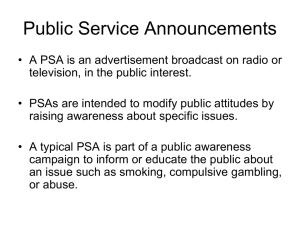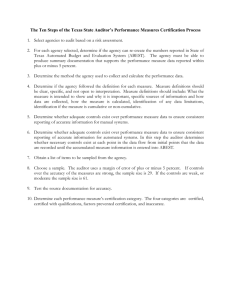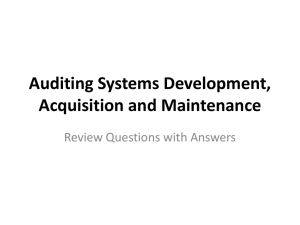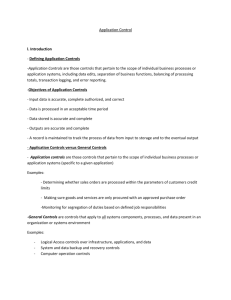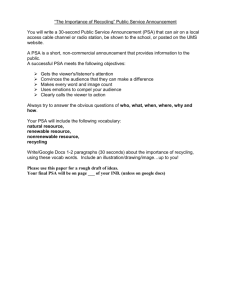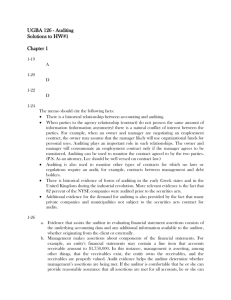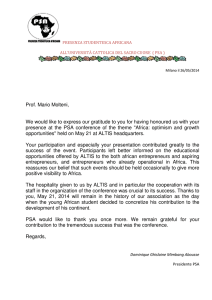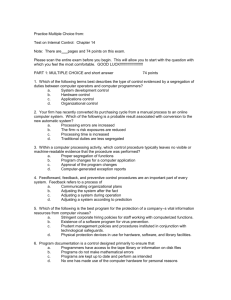Auditing Standards and Practices Council
advertisement
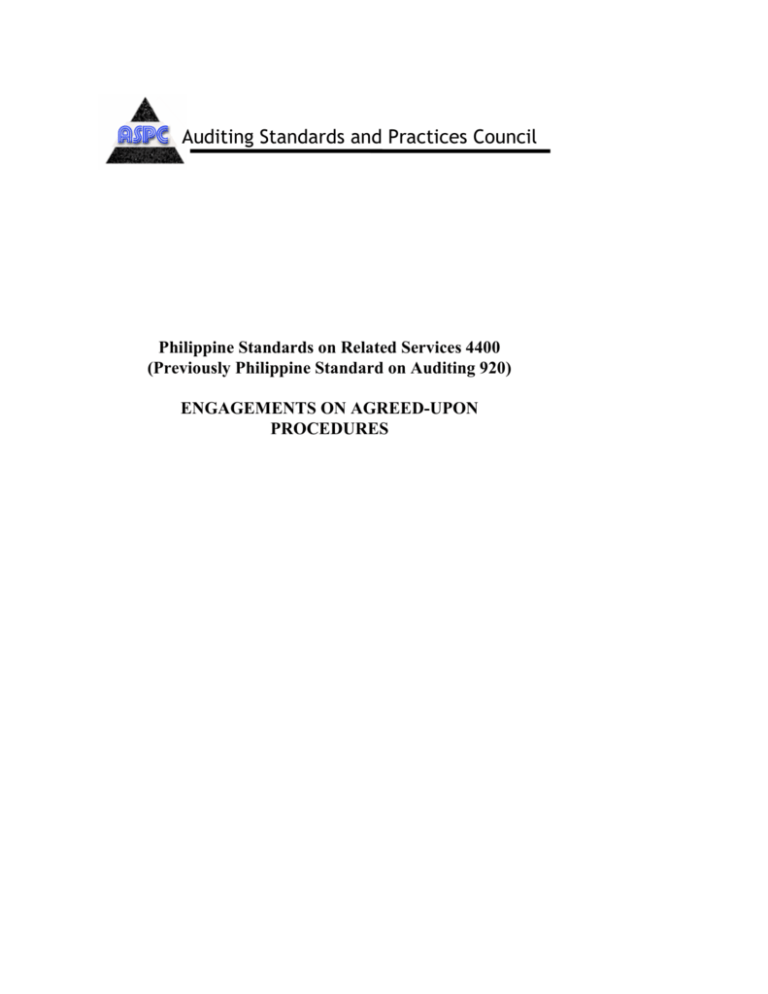
Auditing Standards and Practices Council Philippine Standards on Related Services 4400 (Previously Philippine Standard on Auditing 920) ENGAGEMENTS ON AGREED-UPON PROCEDURES PSRS 4400 (previously PSA 920) PHILIPPINE STANDARDS ON RELATED SERVICES 4400 (PREVIOUSLY PHILIPPINE STANDARD ON AUDITING 920) ENGAGEMENTS ON AGREED-UPON PROCEDURES CONTENTS Paragraphs Introduction 1-3 Objective of an Agreed-upon Procedures Engagement 4-6 General Principles of an Agreed-upon Procedures Engagement 7-8 Defining the Terms of the Engagement 9-12 Planning 13 Documentation 14 Procedures and Evidence 15-16 Reporting 17-18 Effective Date 19 Acknowledgment 20-21 Appendix 1: Example of an Engagement Letter for an Agreed-upon Procedures Engagement Appendix 2: Example of a Report of Factual Findings in Connection with Accounts Payable PSRS 4400 (previously PSA 920) Phlilippine Standards on Auditing (PSAs) are to be applied in the audit of financial statements. PSAs are also to be applied, adapted as necessary, to the audit of other information and to related services. PSAs contain the basic principles and essential procedures (identified in bold type black lettering) together with related guidance in the form of explanatory and other material. The basic principles and essential procedures are to be interpreted in the context of the explanatory and other material that provide guidance for their application. To understand and apply the basic principles and essential procedures together with the related guidance, it is necessary to consider the whole text of the PSA including explanatory and other material contained in the PSA not just that text which is black lettered. In exceptional circumstances, an auditor may judge it necessary to depart from a PSA in order to more effectively achieve the objective of an audit. When such a situation arises, the auditor should be prepared to justify the departure. PSAs need only be applied to material matters. The PSAs issued by the Auditing Standards and Practices Council (Council) are based on International Standards on Auditing (ISAs) issued by the International Auditing Practices Committee of the International Federation of Accountants. The ISAs on which the PSAs are based are generally applicable to the public sector , including government business enterprises. However, the applicability of the equivalent PSAs on Philippine public sector entities has not been addressed by the Council. It is the understanding of the Council that this matter will be addressed by the Commission on Audit itself in due course. Accordingly, the Public Sector Perspective set out at the end of an ISA has not been adopted into the PSAs. PSRS 4400 (previously PSA 920) Introduction 1. The purpose of this Philippine Standard on Auditing (PSA) is to establish standards and provide guidance on the auditor’s1 professional responsibilities when an engagement to perform agreed-upon procedures regarding financial information is undertaken and on the form and content of the report that the auditor issues in connection with such an engagement. 2. This PSA is directed toward engagements regarding financial information. However, it may provide useful guidance for engagements regarding non-financial information, provided the auditor has adequate knowledge of the subject matter in question and reasonable criteria exist on which to base findings. This PSA is to be read in conjunction with PSA 120 “Framework of Philippine Standards on Auditing.” Guidance in other PSAs may be useful to the auditor in applying this PSA. 3. An engagement to perform agreed-upon procedures may involve the auditor in performing certain procedures concerning individual items of financial data (for example, accounts payable, accounts receivable, purchases from related parties and sales and profits of a segment of an entity), a financial statement (for example, a balance sheet) or even a complete set of financial statements. Objective of an Agreed-upon Procedures Engagement 4. The objective of an agreed-upon procedures engagement is for the auditor to carry out procedures of an audit nature to which the auditor and the entity and any appropriate third parties have agreed and to report on factual findings. 5. As the auditor simply provides a report of the factual findings of agreed-upon procedures, no assurance is expressed. Instead, users of the report assess for themselves the procedures and findings reported by the auditor and draw their own conclusions from the auditor’s work. 6. The report is restricted to those parties that have agreed to the procedures to be performed since others, unaware of the reasons for the procedures, may misinterpret the results. 1As explained in the Framework of Philippine Standards on Auditing, “... the term auditor is used throughout the PSAs when describing both auditing and related services which may be performed. Such reference is not intended to imply that a person performing related services need be the auditor of the entity’s financial statements.” PSRS 4400 (previously PSA 920) -2General Principles of an Agreed-upon Procedures Engagement 7. The auditor should comply with the “Code of Professional Ethics for Certified Public Accountants” promulgated by the Board of Accountancy. Ethical principles governing the auditor’s professional responsibilities for this type of engagement are: (a) integrity; (b) objectivity; (c) professional competence and due care; (d) confidentiality; (e) professional behavior; and (f) technical standards. Independence is not a requirement for agreed-upon procedures engagements. Where the auditor is not independent, a statement to that effect would be made in the report of factual findings. 8. The auditor should conduct an agreed-upon procedures engagement in accordance with this PSA and the terms of the engagement. Defining the Terms of the Engagement 9. The auditor should ensure with representatives of the entity and, ordinarily, other specified parties who will receive copies of the report of factual findings, that there is a clear understanding regarding the agreed procedures and the conditions of the engagement. Matters to be agreed include the: • Nature of the engagement including the fact that the procedures performed will not constitute an audit or a review and that accordingly no assurance will be expressed. PSRS 4400 (previously PSA 920) -3- • Stated purpose for the engagement. • Identification of the financial information to which the agreed-upon procedures will be applied. • Nature, timing and extent of the specific procedures to be applied. • Anticipated form of the report of factual findings. • Limitations on distribution of the report of factual findings. When such limitation would be in conflict with the legal requirements, if any, the auditor would not accept the engagement. 10. In certain circumstances, for example, when the procedures have been agreed to between the regulator, industry representatives and representatives of the accounting profession, the auditor may not be able to discuss the procedures with all the parties who will receive the report. In such cases, the auditor may consider, for example, discussing the procedures to be applied with appropriate representatives of the parties involved, reviewing relevant correspondence from such parties or sending them a draft of the type of report that will be issued. 11. It is in the interests of both the client and the auditor that the auditor sends an engagement letter documenting the key terms of the appointment. An engagement letter confirms the auditor’s acceptance of the appointment and helps avoid misunderstanding regarding such matters as the objectives and scope of the engagement, the extent of the auditor’s responsibilities and the form of reports to be issued. 12. Matters that would be included in the engagement letter include: • A listing of the procedures to be performed as agreed upon between the parties. • A statement that the distribution of the report of factual findings would be restricted to the specified parties who have agreed to the procedures to be performed. In addition, the auditor may consider attaching to the engagement letter a draft of the type of report of factual findings that will be issued. An example of an engagement letter appears in Appendix 1 to this PSA. PSRS 4400 (previously PSA 920) -4- Planning 13. The auditor should plan the work so that an effective engagement will be performed. Documentation 14. The auditor should document matters which are important in providing evidence to support the report of factual findings, and evidence that the engagement was carried out in accordance with this PSA and the terms of the engagement. Procedures and Evidence 15. The auditor should carry out the procedures agreed upon and use the evidence obtained as the basis for the report of factual findings. 16. The procedures applied in an engagement to perform agreed-upon procedures may include: • Inquiry and analysis. • Recomputation, comparison and other clerical accuracy checks. • Observation. • Inspection. • Obtaining confirmations. Appendix 2 to this PSA is an example report which contains an illustrative list of procedures which may be used as one part of a typical agreed-upon procedures engagement. Reporting 17. The report on an agreed-upon procedures engagement needs to describe the purpose and the agreed-upon procedures of the engagement in sufficient detail to enable the reader to understand the nature and the extent of the work performed. PSRS 4400 (previously PSA 920) -5- 18. The report of factual findings should contain: (a) title; (b) addressee (ordinarily the client who engaged the auditor to perform the agreed-upon procedures); (c) identification of specific financial or non-financial information to which the agreed-upon procedures have been applied; (d) a statement that the procedures performed were those agreed upon with the recipient; (e) a statement that the engagement was performed in accordance with the Philippine Standard on Auditing applicable to agreed-upon procedures engagements; (f) a statement that the auditor is not independent of the entity if such is the case; (g) identification of the purpose for which the agreed-upon procedures were performed; (h) a listing of the specific procedures performed; (i) a description of the auditor’s factual findings including sufficient details of errors and exceptions found; (j) statement that the procedures performed do not constitute either an audit or a review and, as such, no assurance is expressed; (k) a statement that had the auditor performed additional procedures, an audit or a review, other matters might have come to light that would have been reported; (l) a statement that the report is restricted to those parties that have agreed to the procedures to be performed; PSRS 4400 (previously PSA 920) -6- (m) a statement (when applicable) that the report relates only to the elements, accounts, items or financial and non-financial information specified and that it does not extend to the entity’s financial statements taken as a whole; (n) date of the report; (o) auditor’s address; and (p) auditor’s signature. Appendix 2 to this PSA contains an example of a report of factual findings issued in connection with an engagement to perform agreed-upon procedures regarding financial information. Effective Date 19. This PSA shall be effective for engagements on agreed-upon procedures undertaken beginning on or after December 31, 2003. Acknowledgment 20. This PSA, Engagements on Agreed-Upon Procedures, is based on International Standard on Auditing (ISA) 920 of the same title issued by the International Auditing Practices Committee of the International Federation of Accountants. 21. This PSA differs from ISA 920 with respect to making independence a requirement for agreed-upon procedures engagements (paragraph 7) and the deletion of the section on Public Sector Perspective included in ISA 920. PSRS 4400 (previously PSA 920) -7- This Philippine Standard on Auditing 920 was unanimously approved on August 26, 2002 by the members of the Auditing Standards and Practices Council: Benjamin R. Punongbayan, Chairman Antonio P. Acyatan, Vice Chairman Felicidad A. Abad David L. Balangue Eliseo A. Fernandez Nestorio C. Roraldo Editha O. Tuason Joaquin P. Tolentino Joycelyn J. Villaflores Carlito B. Dimar Froilan G. Ampil Erwin Vincent G. Alcala Horace F. Dumlao Isagani O. Santiago Eugene T. Mateo Emma M. Espina Jesus E. G. Martinez Appendix 1 Deleted: Page Break PSRS 4400 (previously PSA 920) Example of an Engagement Letter for an Agreed-upon Procedures Engagement The following letter is for use as a guide in conjunction with paragraph 9 of this PSA and is not intended to be a standard letter. The engagement letter will need to be varied according to individual requirements and circumstances. Date To the Board of Directors or other appropriate representatives of the client who engaged the auditor. This letter confirms our understanding of the terms and objectives of our engagement and the nature and limitations of the services that we will provide. Our engagement will be conducted in accordance with the Philippine Standard on Auditing applicable to agreed-upon procedures engagements and we will indicate so in our report. We have agreed to perform the following procedures and report to you the factual findings resulting from our work: (describe the nature, timing and extent of the procedures to be performed, including specific reference, where applicable, to the identity of documents and records to be read, individuals to be contacted and parties from whom confirmations will be obtained.) The procedures that we will perform are solely to assist you in (state purpose). Our report is not to be used for any other purpose and is solely for your information. The procedures that we will perform will not constitute an audit or a review made in accordance with Philippine Standards on Auditing and, consequently, no assurance will be expressed. We look forward to full cooperation with your staff and we trust that they will make available to us whatever records, documentation and other information requested in connection with our engagement. PSRS 4400 (previously PSA 920) Appendix 1 -2- Our fees, which will be billed as work progresses, are based on the time required by the individuals assigned to the engagement plus out-of-pocket expenses. Individual hourly rates vary according to the degree of responsibility involved and the experience and skill required. Please sign and return the attached copy of this letter to indicate that it is in accordance with your understanding of the terms of the engagement including the specific procedures which we have agreed will be performed. XYZ & Co Acknowledged on behalf of: ABC Company by ( signed ) ................... Name and Title Date PSRS 4400 (previously PSA 920) Appendix 2 Example of a Report of Factual Findings in Connection with Accounts Payable REPORT OF FACTUAL FINDINGS To (those who engaged the auditor) We have performed the procedures agreed with you and enumerated below with respect to the accounts payable of ABC Company as at (date), set forth in the accompanying schedules (not shown in this example). Our engagement was undertaken in accordance with the Philippine Standard on Auditing applicable to agreed-upon procedures engagements. The procedures were performed solely to assist you in evaluating the validity of the accounts payable and are summarized as follows: 1. We obtained and checked the addition of the trial balance of accounts payable as at (date) prepared by ABC Company, and we compared the total to the balance in the related general ledger account. 2. We compared the attached list (not shown in this example) of major suppliers and the amounts owing at (date) to the related names and amounts in the trial balance. 3. We obtained suppliers’ statements or requested suppliers to confirm balances owing at (date). 4. We compared such statements or confirmations to the amounts referred to in 2. For amounts which did not agree, we obtained reconciliations from ABC Company. For reconciliations obtained, we identified and listed outstanding invoices, credit notes and outstanding checks, each of which was greater than Pxxx. We located and examined such invoices and credit notes subsequently received and checks subsequently paid and we ascertained that they should in fact have been listed as outstanding on the reconciliations. PSRS 4400 (previously PSA 920) Appendix 2 -2- We report our findings below: a) With respect to item 1 we found the addition to be correct and the total amount to be in agreement. b) With respect to item 2 we found the amounts compared to be in agreement. c) With respect to item 3 we found there were suppliers’ statements for all such suppliers. d) With respect to item 4 we found the amounts agreed, or with respect to amounts which did not agree, we found ABC Company had prepared reconciliations and that the credit notes, invoices and outstanding checks over Pxxx were appropriately listed as reconciling items with the following exceptions: (Detail the exceptions) Because the above procedures do not constitute either an audit or a review made in accordance with Philippine Standards on Auditing, we do not express any assurance on the accounts payable as of (date). Had we performed additional procedures or had we performed an audit or review of the financial statements in accordance with Philippine Standards on Auditing, other matters might have come to our attention that would have been reported to you. Our report is solely for the purpose set forth in the first paragraph of this report and for your information and is not to be used for any other purpose or to be distributed to any other parties. This report relates only to the accounts and items specified above and does not extend to any financial statements of ABC Company, taken as a whole. AUDITOR Date Address
